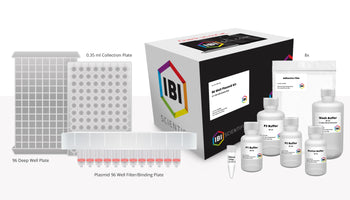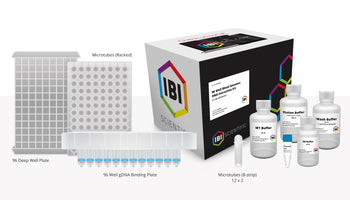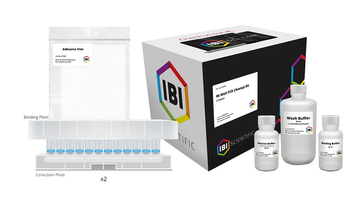
The gBAC Mini Genomic DNA Kit has been optimized for purifying total DNA (including genomic and viral DNA) from gram negative and gram positive bacterial cells. The provided gram positive buffer, when combined with lysozyme, will efficiently lyse bacterial cell walls consisting of peptidoglycan.
- Item Description
- Specifications
- Protocol
- Technical Information
- Columns and Collection Tubes
Additional Item Description:
Chaotropic salt is used to further lyse cells and degrade protein, allowing DNA to bind to the glass fiber matrix of the spin column. Contaminants are removed using a wash buffer (containing ethanol) and the purified genomic DNA is eluted using a low salt elution buffer or TE. The entire procedure can be completed in one hour without phenol│chloroform extraction or alcohol precipitation. The purified DNA is suitable for PCR and other enzymatic reactions.
The quality of the gBAC Mini DNA Bacteria Kit is tested on a lot-to-lot basis by isolating DNA from E. coli (1x109) culture (OD600=1.3, 1 ml) harvested by centrifugation at 16,000 xg for one minute. 10 µl from a 50 µl eluate of purified DNA is analyzed by electrophoresis on a 1% agarose gel.
Additional Details:
Physical Specifications Chart:
| Specifications | gBAC Mini DNA Kit |
| Format: | Spin Column |
| Binding Capacity: | 50 µg |
| Sample Type: | Gram (+) positive and Gram (-) negative bacterial cells,blood and biological fluids such as plasma, urine etc. |
| Sample Concentration: | 1x109bacterial cells 200 µl blood 1 ml urine, plasma |
| Enzyme: | Lysozyme Proteinase K |
| Typical Yield: | 37 µg from 1 x 109E. coli 10-15 µg from 1 x 109Bacillus subtilis |
| Elution Volume: | 30-200 µl |
| Operation Time: | <30 minutes |
Protocol Link:
What is the makeup of the different buffers in the gBAC kit?
Gram + buffer = 20 mM Tris-HCl, 2 mM EDTA, 1% Triton X-100, pH=8.0 GT buffer = Tris-HCl, EDTA and detergents GB buffer = Guanidinium chloride, detergents W1 buffer = Guanidinium chloride, Ethanol Wash buffer = Tris-HCl Elution buffer = 10 mM Tris-HCl
What is the difference between the W1 and the Wash buffer?
The W1 buffer is formulated to remove proteins and nuclease. The Wash buffer removes salts.





































